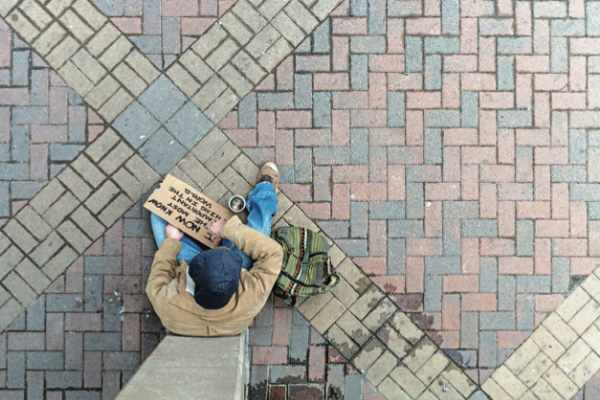OKLAHOMA CITY – After a closed-door executive session lasting approximately an hour, the City Council of Oklahoma City voted 5-4 in favor of appealing to the U.S. Supreme Court to overturn a circuit court ruling that the city’s anti-panhandling ordinance is unconstitutional.
Council members David Greenwell, James Greiner, Mark Stonecipher, Larry McAtee, and Todd Stone voted in favor of the appeal, while JoBeth Hamon, James Cooper, Nikki Nice and Mayor David Holt voted against it.
The December 8 vote authorizes the municipal counselor or his designee to file an appeal in the case of McCraw, et. al. v. City of Oklahoma City.
The ordinance went into effect five years ago, with the city continuously arguing that it was created to keep people safe by preventing individuals from standing in city medians.
The city has already spent approximately $230,000 in outside attorneys’ fees in defense of the ordinance. Moving forward, more fees will be incurred – potentially tens of thousands of dollars in legal expenses – fees that ultimately will be paid by taxpayers.
The 10th U.S. Circuit Court of Appeals in Denver ruled unanimously in August that the 2015 ordinance was unconstitutional. Taking it to the nation’s highest court is going to prove tricky as the Supreme Court of the United States (SCOTUS) receives approximately 8,000 petitions a year but usually grants fewer than 80 of them, said Joseph Thai, a professor of constitutional law at the University of Oklahoma College of Law.
Thai and attorneys with the American Civil Liberties Union and Legal Aid of Oklahoma have worked for more than four years challenging the city’s ordinance. In 2018, Thai and the ACLU attorneys challenged the ordinance in federal court in Oklahoma City before U.S. District Judge Joe Heaton.
Heaton ruled in favor of the ordinance, but the 10th Circuit unanimously struck it down.
The ordinance effectively denied all citizens access to and use of the city’s publicly funded medians. While the 10th Circuit court noted “troubling evidence of animus against panhandlers” in their ruling, constitutional concerns about free speech and a free press doing its job were weighed as well.
FIRST AMENDMENT IMPACT
As Southwest Ledger reported in a prior article on this issue, “plaintiffs in the case included folks like Calvin McCraw, a New Mexico native now living in Oklahoma City, who worked as a street vendor for The Curbside Chronicle, a newspaper addressing issues of homelessness in Oklahoma City. The ordinance prohibited McCraw and other Curbside Chronicle vendors from standing in medians.
While the city stood firm on the issue of the ordinance being one addressing safety concerns, former city council member Meg Salyer stated publicly that the sight of homeless people on street corners and on medians in her ward was affecting the quality of life of her constituents.
Another plaintiff was former online newspaper Red Dirt Report. That publication agreed to be a plaintiff primarily over concerns about accessing medians for purposes of covering breaking news or other newsworthy events. Banning people from the medians was affecting the First Amendment rights not only of Red Dirt Report and The Curbside Chronicle but of all media outlets.
Driving around Oklahoma City today, one cannot help but note the number of panhandlers on city medians and corners, selling copies of The Curbside Chronicle or wrapping paper for Christmas presents. Others not affiliated with the Chronicle are seeking financial assistance or food as more individuals struggle in the midst of the COVID-19 pandemic.
Thai described the 10th Circuit ruling as a “victory for the First Amendment.” Oklahoma City’s latest appeal will again be challenged by the ACLU and Thai, who has litigated before the Supreme Court and written a textbook about the court.
The 10th Circuit ruled that “medians are free speech zones protected by the First Amendment,” Thai noted.
Thai also said that in his understanding of SCOTUS, to be heard via petition there has to be a case of urgent national importance to the American public. The second issue SCOTUS looks at is whether there is a split in lower courts over the matter.
Southwest Ledger tried to contact Oklahoma City Mayor Holt, all members of the council and municipal counselor Kenneth Jordan, but heard back from only Councilman Todd Stone, who represents Ward 4, which includes much of Oklahoma City’s southeast side.
“I’m not a fan of the ordinance,” Stone said, explaining that he does not like the way it was drafted but that some safety concerns remain in his mind, like an interchange along Interstate 240 where panhandlers often gather and appear to be in the way of traffic.
Stone said he could not discuss what was said in executive session but that something was noted that convinced him to vote “yes” and that that information will eventually come out.
Editor’s note: Southwest Ledger reporter Andrew W. Griffin was a plaintiff in this case when he was owner/editor of the Oklahoma online news publication Red Dirt Report. Griffin no longer operates that website.


